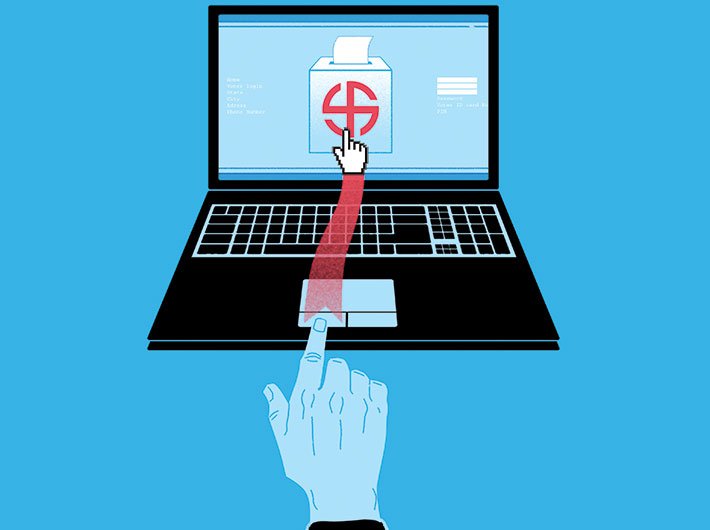Exploring online voting is a step towards a more inclusive democracy. It will have to cross many hurdles before it can take the leap
In 2004, a major technological push in the Indian electoral history took place when 1.5-million electronic voting machines (EVMs) replaced ballot boxes and papers for vote casting. The journey however wasn’t easy.
“It took the election commission of India (ECI) more than 20 years to develop and introduce EVMs in the country after fulfilling all legal requirements and convincing stakeholders about accuracy and integrity of machines,” said chief election commissioner Nasim Zaidi. He was speaking at a seminar organised by the ECI to deliberate on how India can leverage technology to further improve the election process and make it more transparent and credible.
With the voters steadily starting to trust these machines, the ECI now wants to take the next step. It is ready to explore the possibilities of adopting internet or online voting system for the world’s largest electorate base. However, the question is, are we as a nation ready for it?
While the ECI said it will explore this method in long term, Gujarat has already made a beginning. In 2010, the Gujarat state election commission allowed its voters to cast their votes from their laptops or computers anywhere, for its civic elections in urban areas. The state has confidently carried it forward, and will now use it for Gandhinagar civic elections in April. The ECI, however, is not yet convinced about replicating the Gujarat model at a larger level. It is continuing its research to find a secure way.
To begin with, the ECI has recognised four key hurdles in the way of online voting – establishing voters’ identity at the time of election, gaining voters’ trust over technology, using correct methodology for implementation, and building secure transmission of votes through the e-route.
“The online voting system is accepted in smaller elections. But concerns are much different in larger elections like Lok Sabha and Vidhan Sabha polls. The Gujarat model may be a good model but it cannot be directly applicable to larger elections,” said Rajat Moona, director general, C-DAC, and a member of the technical committee set up by the ECI to assess the e-voting system.
One of the major challenges is malware attacks that can cause disruption in transmission of votes, Moona said, adding that such technological challenges can lead to trust deficit among the voters. Whenever a technology is adopted, it is adopted at a slower pace, taking voters, political parties and other stakeholders in confidence, he stated.
“No electoral democracy can afford to have a technology that fails at its simplest and can be manipulated or subjected to malpractices at its worst. This can demolish the credibility of elections,” Zaidi said, highlighting why the ECI is taking one step at a time, and with all precautions, on this new way of voting that will not just bring about a paradigm shift in India’s democratic process but may also bring about a sudden spurt in voting percentage, particularly among the young and urban voters.
In the past, similar questions were raised about the accuracy of EVMs, which led to the introduction of voter verified paper audit trail (VVPAT) that gives a receipt as a proof of a voter’s vote. The entire country will be covered by this machine by the 2019 general elections, Zaidi said.
E-postal ballot system
The ECI has however approved the e-postal ballot system for overseas and service voters – the security personnel. It’s similar to the online voting system and will be implemented once guidelines are formed to legalise it under the constitution, said an ECI official. In this system, the voters can login into the ECI website, take a print-out of ballot paper of their constituency, mark their vote on it, scan it and send it electronically. Verification of an overseas voter will be done with the one-time-password method on his or her registered mobile number, after which he or she will get login details. Other ways of establishing e-voters’ identity, like biometric verification, will be considered on priority, Moona mentioned. At present, the ballot paper has to be downloaded and sent via post by the overseas voters, and service people can use proxy method too.
The guidelines for the e-postal ballot system will at last define the way of its implementation so that amendments in the process are possible, confirmed the official. The method is prone to potential shortcomings, said Moona, for which the ECI needs to be prepared. The foremost is duplication of votes. One can print as many copies of a ballot paper and cast multiple votes. “If two ballot papers are received from the same voter then it needs to be handled properly. We are looking at this verification mechanism at present,” said Moona.
Other challenge is to get manpower for manual counting of mass votes. “With such a system coming into force, the number of votes will go up, resulting in increased traffic and delayed result declaration. The ECI needs to build its capacity for this,” said Moona.
Backed by a strong digital India movement, information technology is surely a next big revolution to come. It will however take its own time to mature. And so, being prepared for it in terms of security help alleviate possible challenges before it hit hard.
How Gujarat does it
Developed by Tata Consultancy Services, the online voting system adopted by Gujarat SEC has been implemented with several levels of security checks. At first, a voter has to register himself in the SEC website as an e-voter. After providing personal details such as name, address, constituency, and mobile number, physical verification is carried out by an executive magistrate 10 days before the election date. Besides, voters are required to register the machine (laptop or computer) from which they will cast their vote. Only six votes are allowed from one machine.
After physical verification, the e-voter gets login id on his email and password on his registered mobile number. It is then his responsibility to secure the sensitive details against misuse, said an officer from Gujarat SEC. On the voting day, the e-voter has to log into the website, wherein he will be directed to his constituency automatically to cast vote.
To avoid duplication of votes, registered e-voters’ names are categorised separately in the voters’ sheet that carries voters’ details, said the official.
On the counting day, online votes are first mixed and then tallied. To protect the privacy of votes, e-voters’ names and their votes are mixed electronically in a way that no one can later identify who voted for whom.
Before every election, the centrally monitored web-based application is assessed by a third-party audit team, said the official, adding that the process is to detect and rectify malware hacking and other technical error possibilities.
taru@governancenow.com
(This article appears in the April 1-15, 2016 issue)

